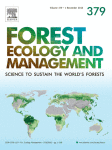Ver ítem
- xmlui.general.dspace_homeCentros Regionales y EEAsCentro Regional Patagonia NorteEEA BarilocheArtículos científicosxmlui.ArtifactBrowser.ItemViewer.trail
- Inicio
- Centros Regionales y EEAs
- Centro Regional Patagonia Norte
- EEA Bariloche
- Artículos científicos
- Ver ítem
Population ecology and classical biological control of forest insect pests in a changing world
Resumen
Forests are important for climate regulation and provide wood and fiber to an increasing human population. Forest systems encompass a large part of the world’s land surface area and they are increasingly threatened by several abiotic and biotic factors, including invasive alien species. Generally, the management of damaging nonnative forest insects relies strongly on classical biological control. This is because other Integrated Pest Management tactics
[ver mas...]
Forests are important for climate regulation and provide wood and fiber to an increasing human population. Forest systems encompass a large part of the world’s land surface area and they are increasingly threatened by several abiotic and biotic factors, including invasive alien species. Generally, the management of damaging nonnative forest insects relies strongly on classical biological control. This is because other Integrated Pest Management tactics may not be readily applicable in forests as these are typically long-lived and structurally complex systems. Given the marked increase in the arrival and establishment of alien forest insects, and the worldwide development of commercial forestry, there is a growing need for classical biological control to achieve persistent pest suppression and to bar the geographical spread of alien pests. Despite much progress in the identification, rearing capacity and release protocols of natural enemies, a limited understanding of pest population ecology and the underlying driving factors, can hinder the effectiveness of classical biological control programs. In this review, we explore the importance of population ecology of forest insects and highlight ecological hypotheses that can serve to lay the groundwork for improved pest management programs in the context of climatic change. While we emphasize the value of classical biological control to manage insect pests in forest systems, especially alien species in novel environments such as in commercial plantations, we draw attention to the need for a better understanding of the processes determining forest insect population dynamics, to secure successful and sustainable pest management programs.
[Cerrar]

Fuente
Forest Ecology and Management 520 : Art. 120400 (Septiembre 2022)
Fecha
2022-09-15
Editorial
Elsevier
ISSN
0378-1127
Formato
pdf
Tipo de documento
artículo
Palabras Claves
Derechos de acceso
Restringido
 Excepto donde se diga explicitamente, este item se publica bajo la siguiente descripción: Creative Commons Attribution-NonCommercial-ShareAlike 2.5 Unported (CC BY-NC-SA 2.5)
Excepto donde se diga explicitamente, este item se publica bajo la siguiente descripción: Creative Commons Attribution-NonCommercial-ShareAlike 2.5 Unported (CC BY-NC-SA 2.5)

